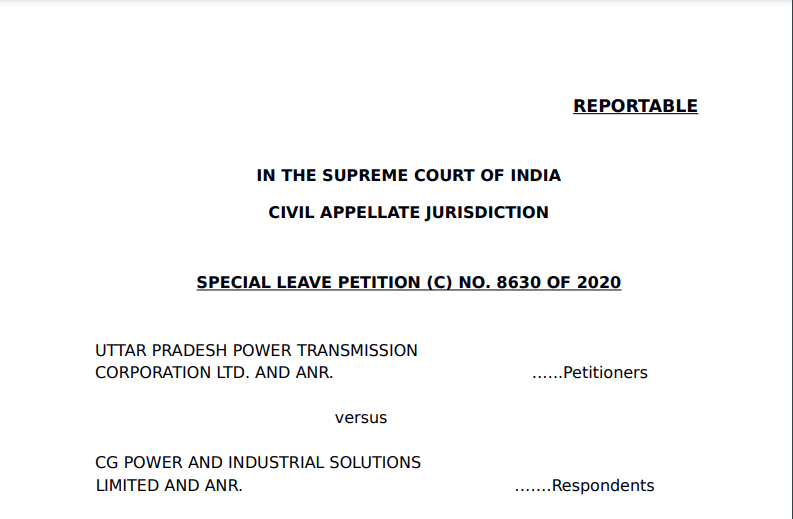Supreme Court Order in the case of Uttar Pradesh Power Transmission Corporation Ltd.
Table of Contents
Case Covered:
Uttar Pradesh Power Transmission Corporation Ltd.
Versus
CG Power And Industrial Solutions Limited
Facts of the Case:
This Special Leave Petition, under Article 136 of the Constitution of India, filed by the Petitioner, hereinafter referred to as the UPPTCL, is against a final Judgment and Order dated 24th February 2020 passed by the High Court of Judicature at Allahabad (Lucknow Bench), allowing the writ petition filed by Respondent No.1 and setting aside the letters dated 2 nd September 2016 and 29th December 2018 issued by the Executive Engineer, Unnao UPPTCL directing the Respondent No.1 to remit Labour Cess amounting to Rs.2,60,68,814/-, computed at 1% of the contract value, under Sections 3 sub-section (1) and (2) of the Building and Other Construction Workers’ Welfare Cess Act, 1996, hereinafter referred to as the “Cess Act”, read with Rules 3 and Rule 4 (1), (2) (3) and (4) of the Building and Other Construction Workers Welfare Cess Rules, 1998, hereinafter referred to as the “Cess Rules” and also Section 2 (1)(d), (g) and (i) of the Building and Other Construction Workers (Regulation of Employment and Condition of Service) Act, 1996, hereinafter referred to as the “BOCW Act”.
Related Topic:
Supreme Court in the case of Assistant Commissioner (CT) Versus M/s. Glaxo Smith Kline Consumer Health Care Limited
The BOCW Act has been enacted to regulate the employment and conditions of service of building and other construction workers and to provide for their safety, health, and welfare measures and for other matters connected therewith or incidental thereto. As per the Statement of Objects and Reasons for the BOCW Act, “it is estimated that about 8.5 million workers in the country are engaged in building and other construction works. Building and other construction workers are one of the most numerous and vulnerable segments of the unorganized labour in India. The building and other construction works are characterized by their inherent risk to the life and limb of the workers. The work is also characterized by its casual nature, the temporary relationship between employer and employee, uncertain working hours, lack of basic amenities and inadequacy of welfare facilities.”
Related Topic:
Supreme Court in the case of Bunga Daniel Babu Versus M/s Sri Vasudeva Constructions
Observations of the Hon’ble Court:
There can be no comparison between the realization of disputed cess by withholding the bills raised by the Respondent No.1 or by invocation of a bank guarantee furnished by the Respondent No.1 after the release of payment to the Respondent No.1, and deduction of Income Tax at the source which is a statutory obligation of any person making a payment which constitutes ‘income’ under Section 192 of the Income Tax Act, 1961.
Related Topic:
Supreme Court in the case of M/s Vellanki Frame Works
As observed above, UPPTCL demanded and partly realized cess on the supply Contract, solely on the basis of the report of the CAG. In our considered view, in the absence of any adjudication, it was impermissible for UPPTCL to issue the impugned communication to realize cess solely on the basis of the report of the CAG.
Related Topic:
Supreme Court in the case of Paramvir Singh Saini Versus Baljit Singh
The Decision of the Court:
In this case, the action of UPPTCL in forcibly extracting building cess from Respondent No.1 in respect of the first contract, solely on the basis of the CAG report, is in excess of the power conferred on UPPTCL by law or in terms of the contract. In other words, UPPTCL has no power and authority and or jurisdiction to realize labour cess under the Cess Act in respect of the first contract by withholding dues in respect of other contracts and/or invoking a performance guarantee. There is no legal infirmity in the finding of the High Court that UPPTCL acted in excess of power by its acts impugned when there was admittedly no assessment or levy of cess under the Cess Act.
Related Topic:
Supreme Court on Doctrine of Frustration and Force majure
Even otherwise, the Cess Act and/or statutory rules framed thereunder prescribe the mode and manner of recovery of outstanding cess under the Cess Act. It is well settled that when a statute requires a thing to be done in a particular manner, it is to be done in that manner alone. UPPTCL could not have taken recourse to the methods adopted by it. The impugned communications have rightly been set aside.
In our considered opinion, the judgment and order of the High Court impugned does not call for inference under Article 136 of the Constitution of India. The Special Leave Petition is, therefore, dismissed.
Related Topic:
Allahabad HC Order in the case of M/s Jindal Pipes Limited Versus The State Of U.P.
Read & Download the Full Decision in pdf:
 ConsultEase Administrator
ConsultEase Administrator
Consultant
Faridabad, India
As a Consultease Administrator, I'm responsible for the smooth administration of our portal. Reach out to me in case you need help.








